Elon Musk's participation in the meeting became a highlight.
Author: He Hao, Wall Street News
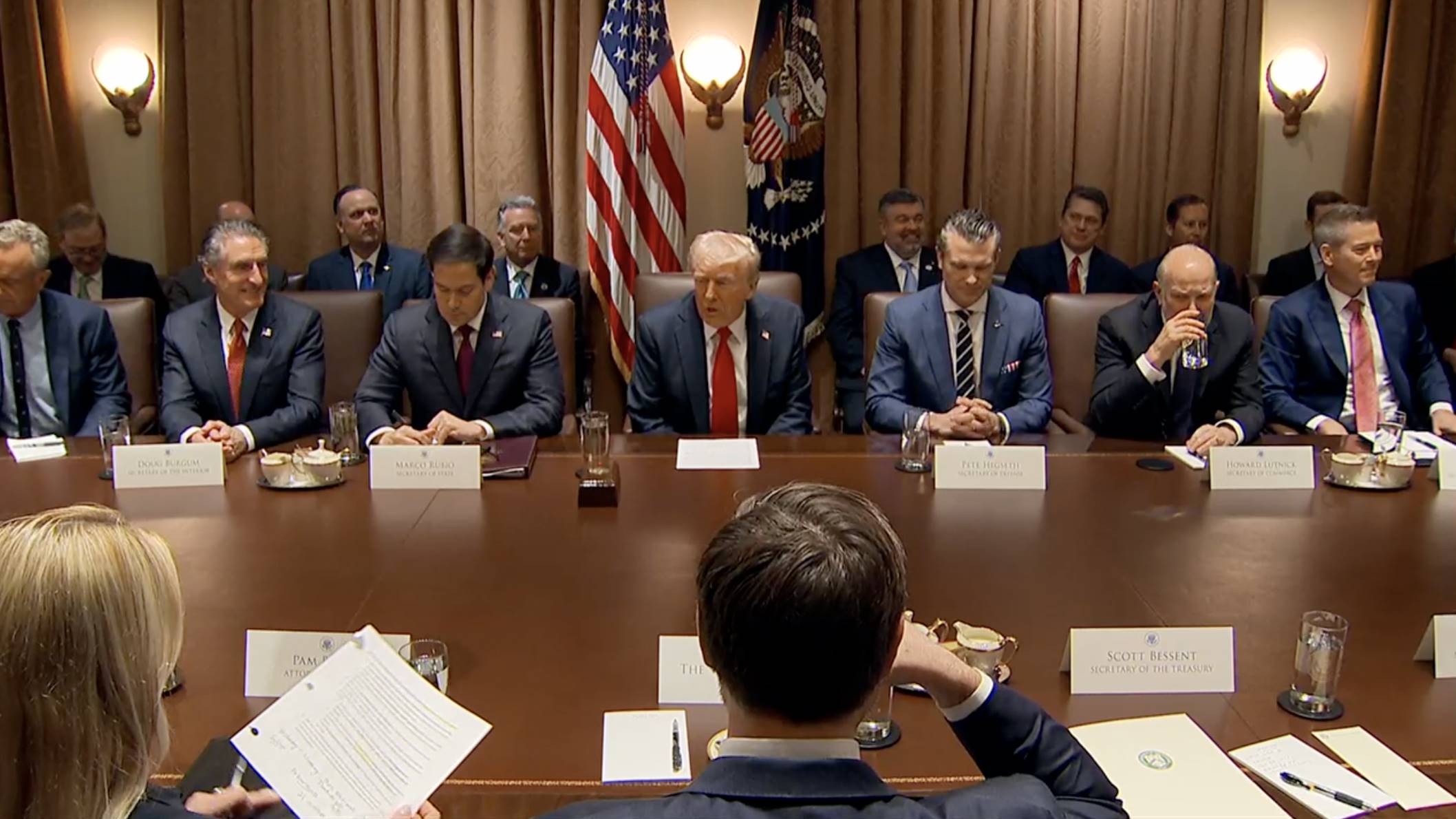
According to CCTV News, on February 26 local time, U.S. President Trump held the first cabinet meeting of his second term.
Around 11 a.m. Eastern Time, just before the cabinet meeting began, U.S. stocks generally maintained earlier gains, with the S&P 500 index up 0.8%, the Dow Jones up 0.3%, the Nasdaq up 1.3%, and the semiconductor index up nearly 2.8%. WTI crude oil futures rose 0.09%, trading at $68.99 per barrel.
U.S.-Ukraine Mineral Agreement
According to CCTV News, Trump confirmed that Ukrainian President Zelensky will visit the U.S. on the 28th to sign a rare earth-related agreement. Trump stated that President Zelensky will visit Washington, D.C., and the U.S. and Ukraine will sign agreements regarding rare earths and other matters. Trump said, "We will get our money back."
Regarding the upcoming U.S.-Ukraine mineral agreement, Trump introduced that the U.S. "will cooperate with Ukraine on rare earths." The U.S. hopes to recover the $350 billion allocated to Ukraine through the mineral agreement.
According to previous media reports, under the agreement, the U.S. and Ukraine will jointly establish a fund, with Ukraine contributing 50% of future revenues from its oil, gas, and mineral resources to the fund. The U.S. will maximize its economic benefits from the fund and reinvest part of the income back into Ukraine.
Trump also stated, "The U.S. will not provide security guarantees for Ukraine in the agreement to end the Russia-Ukraine conflict, but Europe will." He further mentioned that Ukraine "can forget" about joining NATO.
Trump hopes for more talks between the U.S. and Russia. He said that Russian President Putin "must" make concessions in the negotiations to end the Russia-Ukraine conflict. He also expressed a desire to first see if the U.S. can reach an agreement with Russia before discussing easing sanctions. Trump stated that maintaining peace is easy, but reaching (a peace) agreement is difficult.
U.S. Government Efficiency, Deficit, Layoffs
According to CCTV News, Elon Musk, head of the Department of Government Efficiency, although not a cabinet member, also attended the meeting. Musk stated that the overall goal of the Department of Government Efficiency is to help address the massive fiscal deficit. Musk claimed that the U.S. cannot afford an annual fiscal deficit of $2 trillion. If this situation continues, the U.S. will face "bankruptcy." He plans to achieve a $1 trillion deficit reduction by the fiscal year 2026.
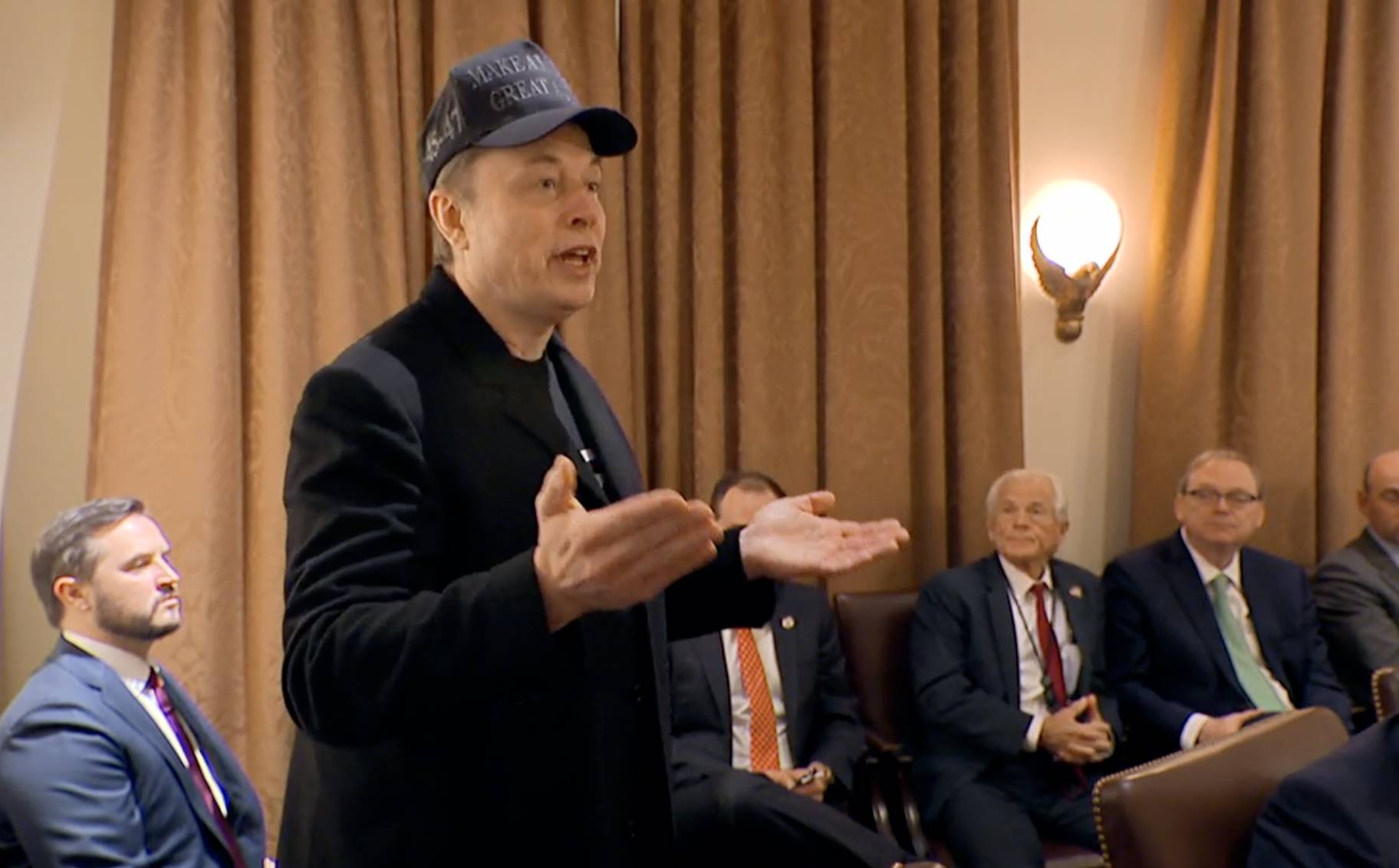
Trump stated that he seeks to have the Department of Government Efficiency (DOGE) save the U.S. federal government up to $1 trillion in spending, hoping to reasonably balance the federal budget in the short term, aiming to balance the budget next year or thereafter.
Trump stated that careful selection of layoff targets in the State Department is necessary. The U.S. will reduce the government and downsize its scale. The head of the Environmental Protection Agency, Zeldin, plans to cut 65% of the agency's staff.
It is reported that a memorandum issued by the Federal Human Resources Agency's Office of Personnel Management and the Office of Management and Budget shows that the Trump administration has instructed agencies to work with the "Government Efficiency Team Leader" to submit "restructuring plans" by March 13 in preparation for large-scale layoffs.
Trump Mentions Inflation
Trump acknowledged that U.S. inflation is declining, partly due to high interest rates.
Trump Discusses Tariffs
The market is highly focused on Trump's tariff issues. During the cabinet meeting on Wednesday, Trump discussed tariffs on Canada, Mexico, and the European Union.
According to CCTV News, on February 26 local time, Trump stated in the cabinet meeting that most tariffs will continue to be implemented. The U.S. will impose a 25% tariff on goods imported from Mexico and non-energy goods imported from Canada starting April 2.
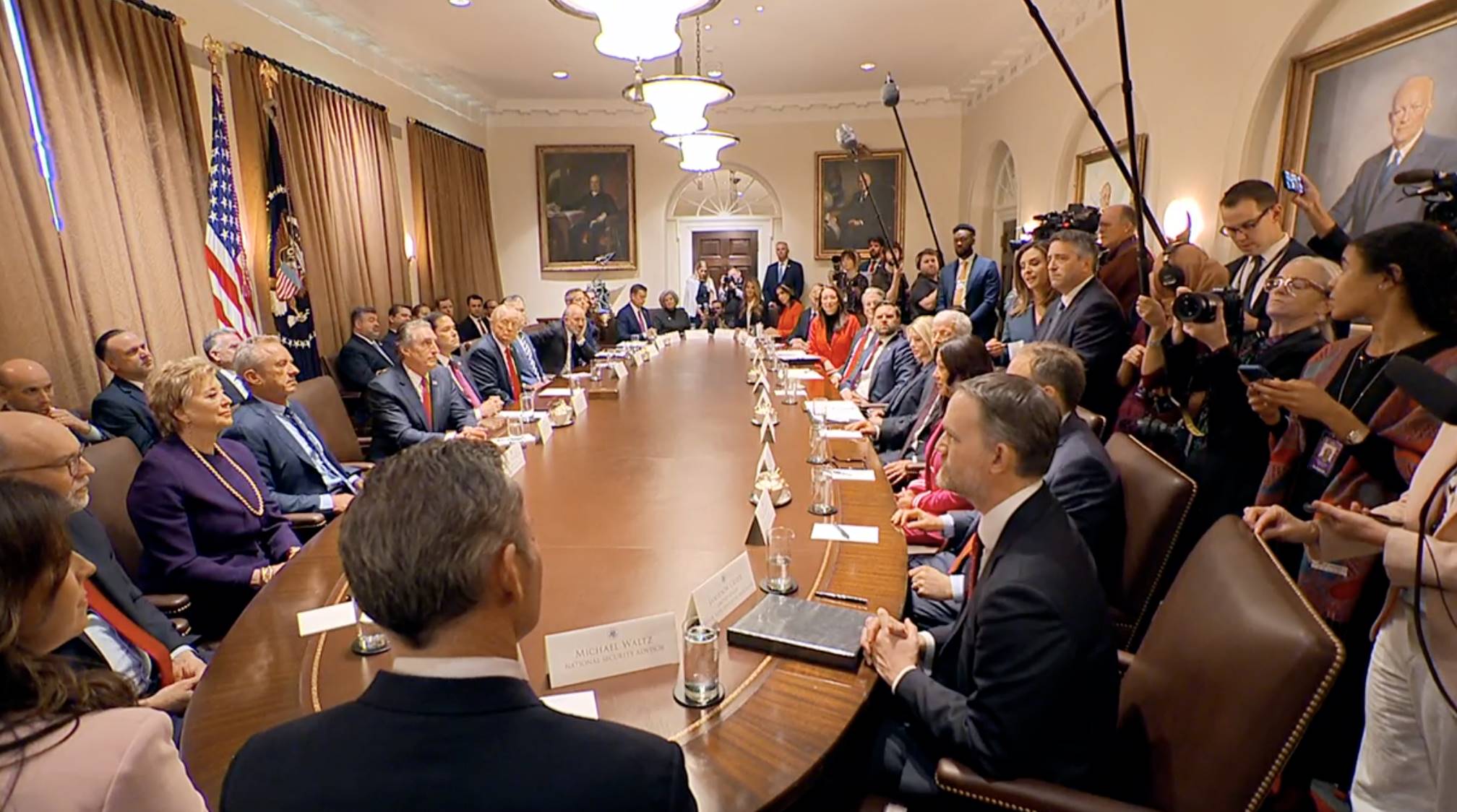
On February 1, Trump signed an executive order imposing a 25% tariff on products imported from Mexico and Canada, with a 10% tariff on Canadian energy products. On the 3rd, Trump announced a 30-day delay in the implementation of the tariff measures for the two countries and continued negotiations. According to this decision, the relevant tariff measures will take effect on March 4. On the 24th, Trump stated that the plan to impose tariffs on Mexico and Canada would "proceed as scheduled." Additionally, on the 13th, Trump signed a memorandum requiring relevant departments to determine "reciprocal tariffs" with each foreign trading partner.
According to Xinhua News, Trump said that the U.S. has decided to impose a 25% tariff on the European Union and will "announce soon." During the cabinet meeting at the White House that day, Trump told the media that overall, the tariff rate on the EU will be set at 25%, applicable to automobiles and various other goods. The EU "takes advantage of the U.S." and "refuses to accept American cars and agricultural products" for various reasons, resulting in a trade deficit of about "$300 billion" between the U.S. and the EU.
The political news website Politico previously reported that the U.S.-EU trade deficit is not as large as Trump claims. According to EU data, the U.S. had a goods trade deficit of €155.8 billion (approximately $168.6 billion) with the EU in 2023, while in services trade, the U.S. achieved a surplus of €104 billion (approximately $112.6 billion). Overall, the U.S. trade deficit with the EU is €51.8 billion (approximately $56 billion).
It should be noted that Trump provided a series of contradictory answers regarding tariffs on Canada, Mexico, and the EU on Wednesday:
At the cabinet meeting on Wednesday, a reporter asked Trump if he planned to officially implement the 25% tariff on Canada and Mexico on March 4. Trump replied, "I will not stop the tariffs."
Earlier this month, Trump announced these tariff measures but later reached an agreement with the leaders of the two countries to delay the implementation date by one month in exchange for stricter border control measures. This delay will expire next week.
However, later on Wednesday, Trump stated that the tariffs on Mexico and Canada would take effect on April 2.
U.S. Commerce Secretary Luthnick stated at the meeting that the overall tariff actions against various countries will be implemented on April 2.
Some analysts noted that it is unclear whether Trump was referring to giving Mexico and Canada additional time or if he confused this tariff measure with another global "reciprocal tariff" plan being developed by the U.S. Department of Commerce and the U.S. Trade Representative's Office. Trump's statements regarding the tariff timeline often leave the market confused, as he tends to mention multiple plans simultaneously when responding to reporters' questions.
After Trump's statements on Wednesday, the market believed he might delay the tariffs on imports from Canada and Mexico, leading to a temporary rise in related assets in Mexico, Canada, and Europe:
The Mexican peso quickly rose against the dollar, climbing from below 20.45 pesos to above 20.30 pesos, reaching a daily high.
The U.S. dollar rose about 0.2% against the Canadian dollar, trading at 1.4342.
The euro nearly completely recovered its earlier losses against the dollar. The iShares MSCI Europe ETF listed in the U.S. rose 0.75%, and the iShares MSCI Eurozone ETF rose 0.89%, holding steady near daily highs.
Electric vehicle concept stocks saw Lucid drop 10.7%, Tesla down 0.9%, Honda up 1.5%, Ford up 1.6%, General Motors up 5.5%, and Chinese concept stock Xpeng up 15%.
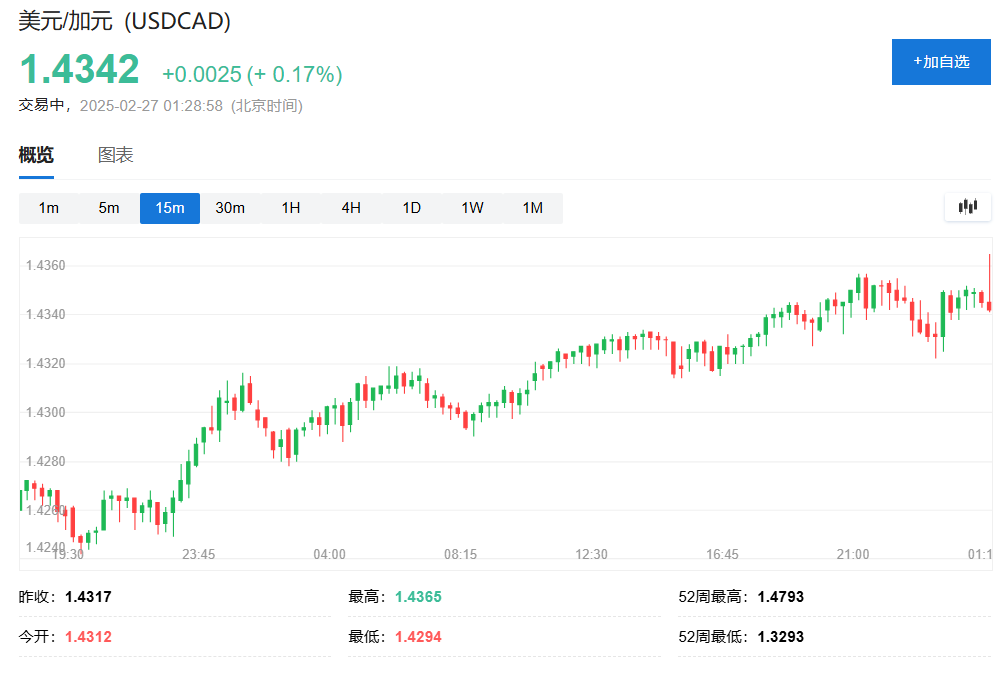
However, related assets later reacted to the impact of the tariffs, with U.S. stocks continuing to decline, and the euro and European ETFs listed in the U.S. retreating from their highs:
U.S. stocks gave back most of their early gains, with the Nasdaq 100 reversing an early gain of over 1% to turn negative, hitting a new daily low. Component stock Axon rose 16.81% during the day, Intuit was up 11.46%, Micron Technology and Broadcom rose over 4.4%, Nvidia was up 3.4%, Meta rose 2.6%, and Palantir rose 1.87%; however, Apple fell over 2.7%, Tesla dropped over 2.8%, Kraft Heinz, Mondelez International, PepsiCo, VRSK, and KDP fell over 3%, and AppLovin dropped 12.69%, remaining the worst performer.
The euro fell again against the dollar by over 0.2%, hitting a low of 1.0484. The iShares MSCI Europe ETF listed in the U.S. retreated from a daily high of $58.86, rising 0.22% during the day and hitting a daily low of $58.50. The iShares MSCI Eurozone ETF listed in the U.S. rose 0.35%, hitting a daily low of $53.38, quickly retreating from a daily high of $53.82.
Subsequently, the euro fell 0.28% against the dollar, trading at 1.0486. AFP cited a report from the European Commission stating that the EU will "immediately and firmly" counter U.S. tariffs.
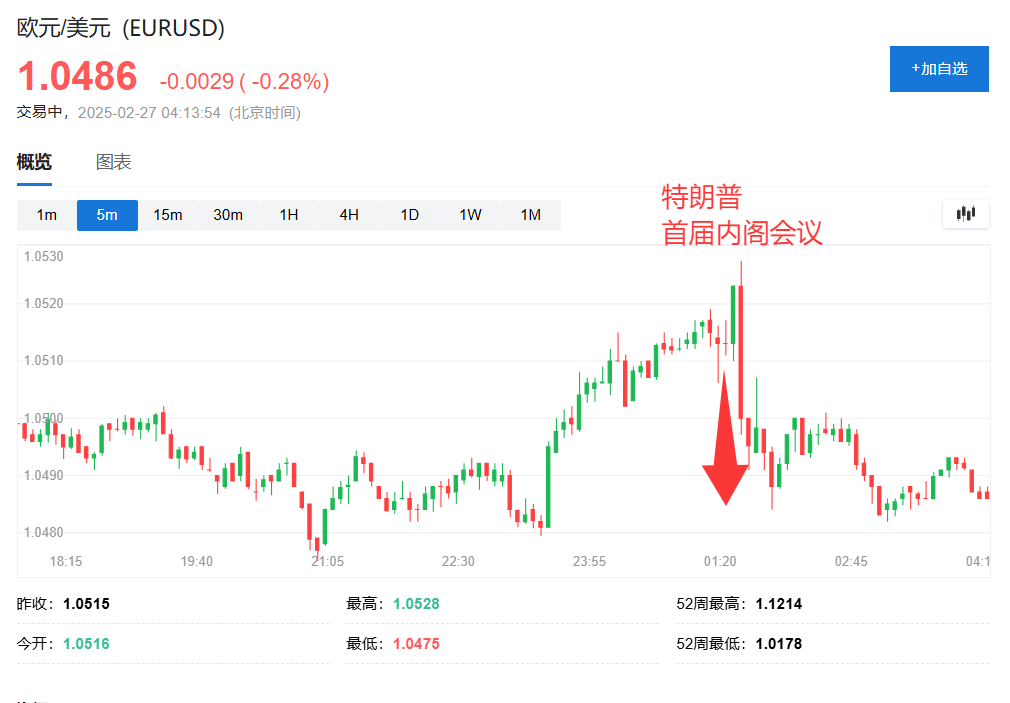
U.S. President Trump Orders Termination of Oil Trade with Venezuela
According to CCTV News, on February 26 local time, Trump announced the revocation of the "concessions" granted to Venezuela by former President Biden. Trump stated that he is rescinding the "concessions" in the "oil trade agreement dated November 26, 2022."
Venezuela severed diplomatic relations with the U.S. starting in January 2019, while the U.S. continued to expand economic sanctions against Venezuela, including banning the import of Venezuelan crude oil and freezing the assets of the Venezuelan oil company in the U.S. On November 26, 2022, the U.S. government announced it would issue a license to Chevron, allowing the company to partially resume its crude oil extraction operations in Venezuela and transport the country's crude oil to the U.S.
WTI crude oil futures fell 0.54%, trading at $68.56 per barrel.
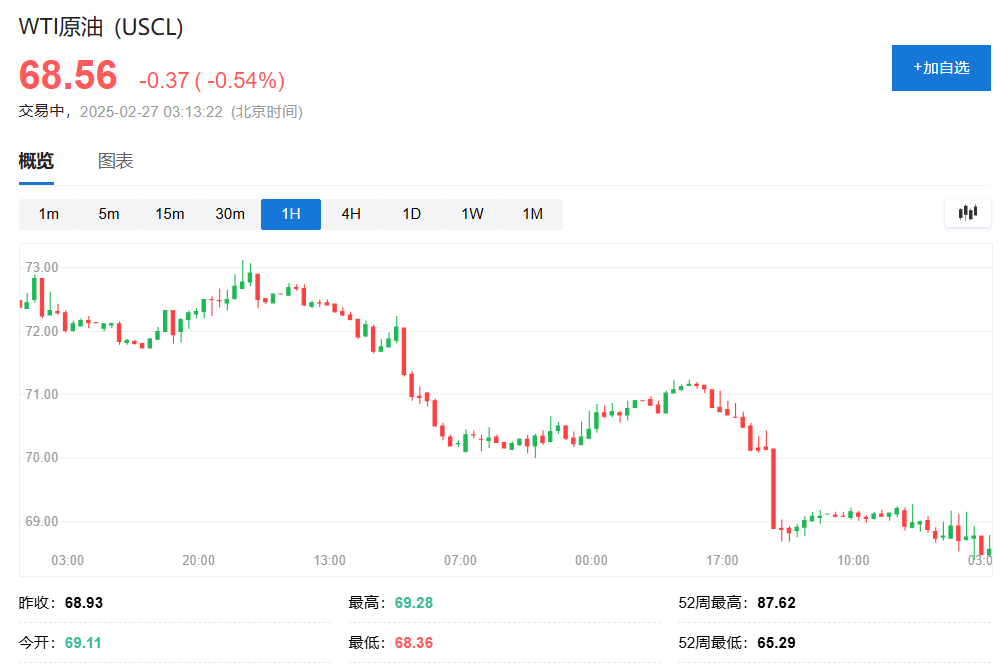
"Immigrant Gold Card" to Launch in About Two Weeks
At Wednesday's cabinet meeting, Trump again mentioned the "Gold Card" program, stating that it will launch in about two weeks, and the revenue generated can be used to pay off the national debt.
Previously, on February 25 local time, Trump told the media at the White House that he plans to start selling the U.S. "Gold Card" priced at $5 million each in two weeks, targeting wealthy immigrants. According to him, this "Gold Card" will not directly grant U.S. citizenship to the purchaser, so it does not need to go through the U.S. Congress, but it will provide rights similar to those of a "Green Card" and is a "powerful pathway to obtaining U.S. citizenship."
White House Refuses Access to Reporters from AP and Other Media for Trump's Cabinet Meeting
According to CCTV News, under the new policy regarding media reporting by the U.S. government, the White House denied access to reporters from the Associated Press and other news agencies for Trump's first cabinet meeting of his second presidential term. It is reported that the White House denied entry to a photographer from the Associated Press and three reporters from Reuters, The Huffington Post, and Germany's Der Spiegel.
免责声明:本文章仅代表作者个人观点,不代表本平台的立场和观点。本文章仅供信息分享,不构成对任何人的任何投资建议。用户与作者之间的任何争议,与本平台无关。如网页中刊载的文章或图片涉及侵权,请提供相关的权利证明和身份证明发送邮件到support@aicoin.com,本平台相关工作人员将会进行核查。




